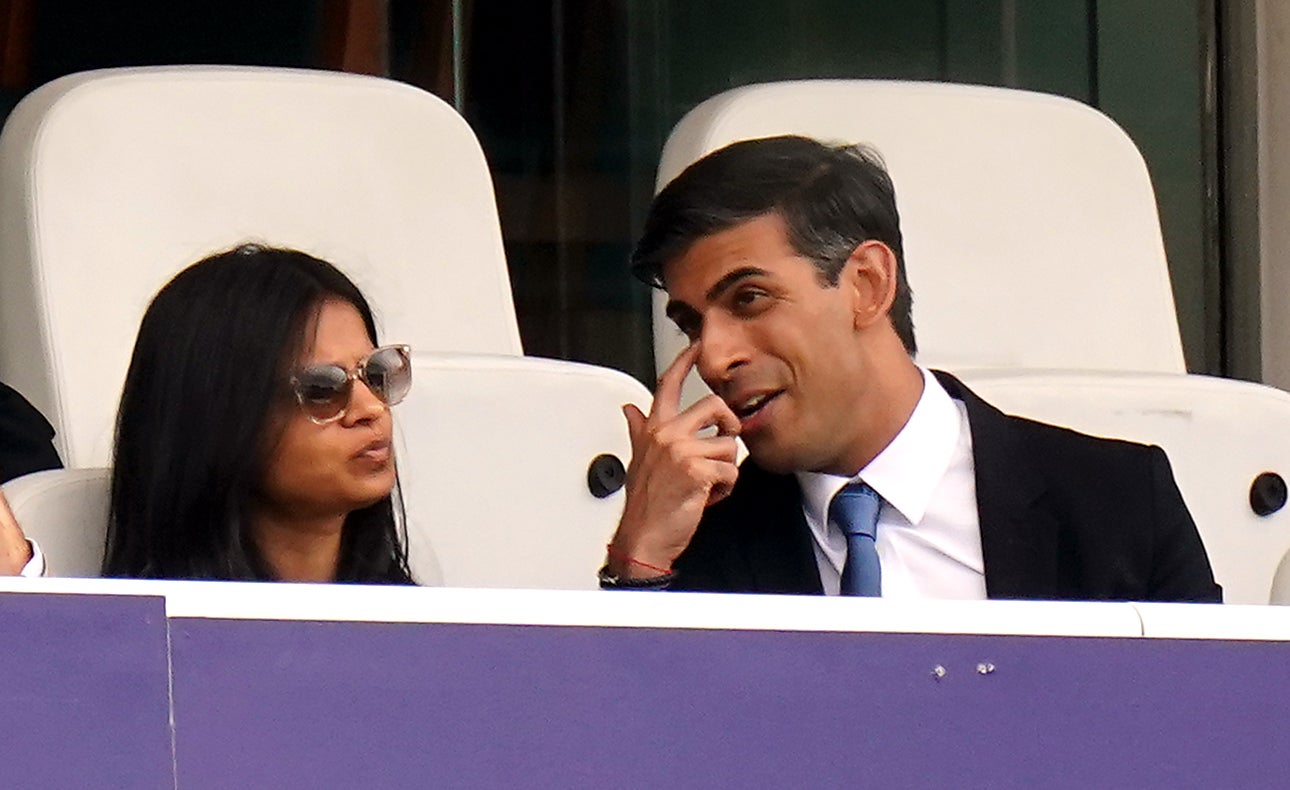Rishi Sunak’s non-dom wife’s income is a matter of legitimate public interest
Editorial: Politically it adds to the impression of a cabinet and party out of touch with a population struggling with the cost of living crisis

Chancellor Rishi Sunak was at his most uxorious the other day when television interviewers challenged him about his wife’s links to a large tech company sustaining its operations in Moscow, even as sanctions were being imposed on Russian trade.
Looking hurt, he pleaded that his wife was not a politician, and it is fair to add that Akshata Murthy’s extreme wealth – about £400m by most accounts – derives in part from the business activities of her billionaire father and the Infosys company he founded. In any case, the Moscow arm of Infosys was wound down soon after the story broke.
The revelations we report today about the tax status of the wife of the chancellor of the exchequer raise even more questions. The potential conflict that her non-dom status (at least until 2020 and – possibly – dormant or rescinded since) causes or has caused is obvious.
Contrary to Mr Sunak’s protestations, the pecuniary interests of spouses are a matter of legitimate public interest and are also addressed in the ministerial code. It states that ministers should give the civil service a “full list” of interests, and this “should also cover interests of the minister’s spouse or partner and close family, which might be thought to give rise to a conflict”.
“Thought to be” is the operative clause there. There’s no reason to think Ms Sunak did anything wrong, let alone illegal. Far from it; the point is that such avoidance of tax is perfectly lawful. The problem arises from the career her husband has chosen. Most reasonable observers would say that a minister at the Treasury would have a say in the formulation of tax policy for non-doms; and if the minister happens to be married to a non-dom then that’s indeed relevant (albeit unusual).
For example, in this case it might be argued by the uncharitable that non-doms could have been taxed more in a situation where the UK is suffering the highest tax burden since the Second World War. But Mr Sunak plans to leave non-doms alone. The point is that there may be good reasons not to tax non-doms more heavily and drive their wealth out of the country (and reduce the tax take), but it’s the impression that’s problematic. As the introduction to the ministerial code also states, there must be “no actual or perceived conflicts of interest”.
Politically it adds to the impression of a cabinet and party out of touch with a population struggling with the cost of living crisis.
Fond as many are of their old schools, few could spare £100,000 to fund an underprivileged child through private education at their alma mater, as Mr Sunak has done in association with Winchester. Whatever income the chancellor’s wife receives via dividend income will not be affected by the hike in national insurance, though the freeze on thresholds will do so. But it’s the non-dom status that will really affect the Sunak family’s personal net wealth. It is in the nature of the institution of marriage that the financial affairs of the couple are pooled and intimately linked.
The families Theresa May used to say were “just about managing” are not managing at all now. “Eat or heat” is a reality for some. And there was almost nothing in his spring statement for those out of work and unable to work. With inflation approaching double figures and benefits being updated by 3.1 per cent, the squeeze on those on the lowest incomes will be obviously painful, and even more so after their temporary £20 Covid uplift has been withdrawn.
It looks, feels and is callous, and would be even if the chancellor was a poor man; that he luxuriates in such vast wealth, symbolised by the “second home” (there are more than two) in California. The stunt with a Kia Rio at a Sainsbury’s petrol station was as clumsy as it was unconvincing – a man who takes the voters for gullible stooges.
To keep up to speed with all the latest opinions and comment, sign up to our free weekly Voices Dispatches newsletter by clicking here
It should not be embarrassing for a Conservative politician to be very rich or to marry someone who is wealthier than the Queen, as is often noted. The Conservative Party is not some Marxist sect, and it is supposed to regard money as a reward for enterprise, a symbol of success, and nothing to be ashamed of. The cabinet is full of rich men and women. Jacob Rees-Mogg, for example, is worth many millions, and even the prime minister’s farming family is not without means, though he himself is far from a paragon of personal financial husbandry.
As we see from their most recent high-profile champagne-filled bash, conspicuous consumption is no barrier to success. Vulgar refurbishment of the prime minister’s Downing Street accommodation, paid for by a donor, is regarded as trivial.
However, today’s populist Tory party with its talk of “levelling up” and “one nation” would be wise to consider how the behaviour of its most prominent figures is perceived by the public as they think twice about putting the heating on and wait forever for a GP appointment.
Being married to a non-dom is not a good look. Bad luck, Rishi.






Join our commenting forum
Join thought-provoking conversations, follow other Independent readers and see their replies
31Comments